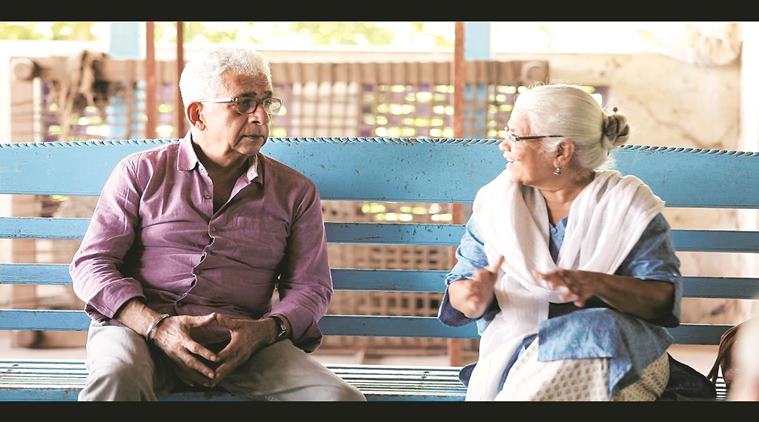Remembering Hamid
A documentary chronicles the life of social reformer Hamid Dalwai. Subhash’s research has culminated in Hameed: The Unsung Humanist, a documentary on Dalwai that was screened in Pune on June 17, before its screening in Mumbai
Written by Dipti Nagpaul D'souza | Updated: June 18, 2018 2:54:18 pm

Naseeruddin Shah with Jyoti Subhash. (Express photo)
Growing up in Rehmatpur, Satara, Jyoti Subhash was more than familiar with names like Sane Guruji and Hamid Dalwai. Her parents, who were freedom fighters, would host a number of artists and activists at their home and people like Dalwai were regulars. The conversations they had and her parents’ socialistic thinking instilled in Subhash a sense of responsibility towards society that stayed with her even as she went on to become an established name in Marathi cinema and theatre.
However, it wasn’t until a couple of years ago that Subhash rediscovered Dalwai. “A Muslim reformist, he was being awarded posthumously for his work. I happened to be at the function, and listening to all his achievements made me realise that I had probably never known the man and his work. This set me off to explore and tell Hamid Dalwai’s story,” recounts the 70-year-old Pune-based veteran actor.
Subhash’s research has culminated in Hameed: The Unsung Humanist, a documentary on Dalwai that was screened in Pune on June 17, before its screening in Mumbai. A biographical sketch, the film explores his contribution towards Muslim reforms. The founder of the Muslim Satyashodhak Mandal in Pune, he was the first in the country to lead a march against triple talaq, halal and polygamy. Also a noted Marathi and English writer, he authored Indhan, which was later translated to English by his friend Dilip Chitre.
The actor-director feels that not many know of Dalwai’s work. “My generation is still aware of him but the younger ones do not know him at all. The documentary is a means of chronicling the man,” says Subhash.
After the award ceremony triggered her interest in Dalwai, Subhash went back to his writings, including the seminal collection of essays, Muslim Politics in Secular India. She felt she needed to understand the man and what pushed him towards initiating Muslim reforms. “He was born in Mirjoli village in Chiplun, along the Konkan coast. At a very early age he became a part of the Socialist Party’s youth wing, Rashtra Seva Dal. Even though he was growing in the party, he left it because he believed that real change can be brought only by working within the Muslim community,” says Subhash. Born in 1932, Dalwai died early, at the age of 45, due to kidney failure.
The filmmaker has experimented with the documentary’s format by bringing together Naseeruddin Shah, actor Amrita Subhash (also her daughter) and Hamid Dabholkar, the son of slain rationalist Narendra Dabholkar. The three head out in quest of Dalwai, tracing his life, visiting his village, and speaking to people who worked with him.
Dalwai’s battle against triple talaq was won recently when the apex court abolished the practice. However, the decision came amidst controversy. While the documentary looks at Dalwai’s fight for social justice, Subhash says she has chosen to leave the politics aside. “It’s meant to be a chronicle of the life and work of a great reformist, a means by which to remember him,” says she.
For all the latest Lifestyle News, download Indian Express App






















No hay comentarios:
Publicar un comentario